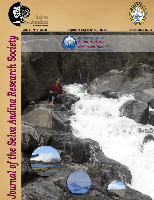
Journal of the Selva Andina Research Society
Scope & Guideline
Exploring the Rich Tapestry of Andean Biodiversity and Culture
Introduction
Aims and Scopes
- Agricultural Research:
The journal publishes studies on crop performance, biostimulants, and the impact of agricultural practices on yield, particularly in the context of Andean crops and local farming systems. - Environmental Science:
Research on soil pollution, heavy metals, and the ecological impacts of industrial activities is a key focus, emphasizing the importance of sustainable practices in the Andean environment. - Biodiversity and Species Documentation:
The journal encourages contributions that document and describe biodiversity, including new species records and morphological studies, which are crucial for conservation efforts in the Andean region. - Health and Nutrition:
Studies on the nutritional benefits of local crops and health interventions, particularly in relation to traditional diets and food security, form an important aspect of the journal's scope. - Scientific Communication:
Emphasis on the role of scientific communication in disseminating research findings and fostering collaboration among researchers, practitioners, and policymakers.
Trending and Emerging
- Sustainable Agricultural Practices:
There is a growing emphasis on biostimulants, organic farming, and sustainable agricultural practices, indicating a shift towards environmentally friendly farming methods that enhance productivity without harming ecosystems. - Health and Nutrition Interventions:
Research on health interventions related to nutrition, particularly studies focusing on the benefits of local crops and dietary practices, is gaining traction, reflecting an increasing interest in food security and public health. - Pollution and Environmental Impact Studies:
The assessment of pollution, particularly heavy metals in soils, has emerged as a critical area of research, highlighting the need for environmental monitoring and remediation strategies. - Biodiversity Conservation and Documentation:
With increasing awareness of biodiversity loss, studies documenting new species and the ecological roles of various organisms are on the rise, emphasizing conservation efforts in the Andean region. - Innovative Agricultural Technologies:
The integration of digital phenotyping and other innovative technologies in agricultural research is becoming more prominent, suggesting a trend towards modernization and efficiency in agricultural practices.
Declining or Waning
- Traditional Medicinal Plants:
Research focusing specifically on traditional medicinal plants, their uses, and efficacy has decreased, possibly due to a shift towards more empirical agricultural and environmental studies. - General Agricultural Practices:
While specific studies on crop performance remain prevalent, broader discussions on general agricultural practices without a direct focus on Andean crops are becoming less common. - Microbial Studies in Agriculture:
Although microbial interactions are still relevant, the emphasis on microbial studies in the context of agriculture has waned, with fewer publications focusing solely on microbial dynamics. - Socioeconomic Studies in Agriculture:
Research that intertwines socioeconomic factors with agricultural practices is appearing less frequently, suggesting a potential gap in understanding the socio-economic dimensions of agriculture in the region.
Similar Journals
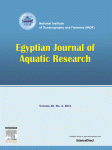
Egyptian Journal of Aquatic Research
Connecting researchers to elevate aquatic understanding.Welcome to the Egyptian Journal of Aquatic Research, a premier peer-reviewed academic journal published by ELSEVIER, dedicated to advancing the field of aquatic sciences. With a robust impact factor and recognition as a Q1 journal in key categories such as Aquatic Science and Ecology, this open access journal has established itself as a vital platform for disseminating high-quality research since its inception in 2012. The journal aims to provide comprehensive coverage of topics including ecology, evolutionary biology, and water science, making it a crucial resource for researchers, professionals, and students engaged in these dynamic fields. With Scopus rankings placing it in the top echelons of various categories, the Egyptian Journal of Aquatic Research fosters innovation, collaboration, and knowledge dissemination on a global scale, making it an indispensable asset for anyone invested in understanding and preserving aquatic systems.

JOURNAL OF THE NATIONAL SCIENCE FOUNDATION OF SRI LANKA
Connecting Researchers for a Sustainable FutureJOURNAL OF THE NATIONAL SCIENCE FOUNDATION OF SRI LANKA, with ISSN 1391-4588 and E-ISSN 2362-0161, is a respected academic publication disseminated by the National Science Foundation of Sri Lanka. Operating since 1999, this journal encompasses a broad spectrum of multidisciplinary research, currently positioned in the Q3 category and ranking #101 out of 171 in its field, indicating its significant contribution to advancing knowledge across various scientific domains. With an ambition to foster local and international scholarly dialogue, the journal encourages submissions that address fundamental and applied aspects of science pertinent to Sri Lanka and beyond. Though it operates under a conventional access model, the journal is committed to promoting high-quality, peer-reviewed articles that are vital for researchers, professionals, and students aiming to stay at the forefront of scientific advancements in the region.

Chemical and Biological Technologies in Agriculture
Advancing Agricultural Innovations for a Sustainable FutureChemical and Biological Technologies in Agriculture is a premier open-access journal published by SPRINGER, dedicated to advancing research in the fields of agronomy, crop science, biochemistry, biotechnology, and food science. Established in 2014, this journal has quickly gained recognition, boasting impressive rankings with Q1 status in Agronomy, Crop Science, Biotechnology, and Food Science categories as of 2023, underscoring its significance in fueling innovations in agricultural technology. With an E-ISSN of 2196-5641, it provides a platform for researchers and practitioners to disseminate impactful findings and methodologies that address key challenges in sustainable agricultural practices. By facilitating open access to contemporary research, the journal aims to foster collaboration and knowledge exchange among multidisciplinary stakeholders in the agricultural sector. With a commitment to excellence reflected in its Scopus rankings, notably #57 in Agronomy and Crop Science, it serves as an invaluable resource for professionals, researchers, and students striving for breakthroughs in chemical and biological technologies. The journal remains at the forefront of addressing global food security and environmental sustainability through rigorous scientific inquiry.

GENETIC RESOURCES AND CROP EVOLUTION
Transforming Agriculture with Cutting-Edge Genetic ResearchGENETIC RESOURCES AND CROP EVOLUTION is a leading academic journal dedicated to the exploration and advancement of genetic resources in agriculture, evolutionary biology, and plant science. Published by Springer in the Netherlands since 1992, this journal aims to foster a greater understanding of the genetic basis of crop evolution and diversity. With a robust impact reflected in its Q2 status in multiple categories, including Agronomy, Ecology, and Plant Science, it ranks impressively within the top quartiles of its fields. As of 2023, it continues to be an essential resource for researchers, professionals, and students who seek to enhance sustainable crop production and biodiversity conservation through innovative genetic methodologies. The journal promotes high-quality, peer-reviewed research that contributes valuable insights into the genetic adaptation of crops in response to environmental changes. While the journal is not open access, its esteemed reputation ensures that the insights it provides reach a wide audience eager to address some of today's most pressing agricultural challenges.
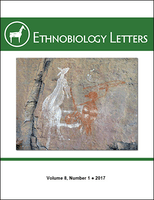
Ethnobiology Letters
Illuminating the Cultural Dimensions of BiodiversityEthnobiology Letters is a pioneering journal in the field of ethnobiology, dedicated to the scientific study and documentation of the intricate relationships between human cultures and biological diversity. Published by the Société d'Éthnobiologie, this open-access journal has been providing an invaluable platform for researchers and scholars since its inception in 2010. Operating under the ISSN 2159-8126, it aims to promote accessibility and dissemination of knowledge across global communities by making its content freely available. Its contributions have garnered recognition in the realms of anthropology and agricultural sciences, achieving notable ranks in Scopus with a percentile standing in the 56th for Social Sciences and 41st for Agricultural and Biological Sciences. By fostering interdisciplinary dialogue and sharing innovative research, Ethnobiology Letters serves as a crucial resource for academics, practitioners, and students engaged in the exploration of the cultural dimensions of biodiversity.
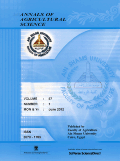
ANNALS OF AGRICULTURAL SCIENCES
Exploring Innovations that Cultivate Tomorrow's SolutionsANNALS OF AGRICULTURAL SCIENCES, published by Elsevier, stands as a leading open access journal dedicated to the multifaceted field of agricultural sciences. Since its inception in 2011, this journal has served as a pivotal platform for the dissemination of high-quality research, covering areas such as agronomy, animal science, horticulture, food science, plant science, and soil science. With an impressive Q1 ranking across multiple disciplines and notable positions in Scopus Ranks—including #6 in Animal Science and Zoology and #3 in Horticulture—this journal is recognized globally for its significant contribution to advancing agricultural innovations. The journal caters to a diverse audience of researchers, professionals, and students, providing them with open access to cutting-edge studies that address critical issues in agricultural productivity and sustainability. Its commitment to high-impact research ensures that articles contribute meaningfully to the scientific community, fostering advancements in agricultural practices and policies.
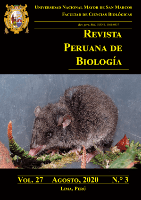
REVISTA PERUANA DE BIOLOGIA
Unlocking the Potential of Biological Knowledge for AllREVISTA PERUANA DE BIOLOGIA, an esteemed journal published by the Universidad Nacional Mayor de San Marcos, Faculty of Biological Sciences, has been a vital platform for disseminating significant biological research since its inception in 1974. With an Open Access model, this journal ensures that high-quality research is freely available to readers across the globe, fostering the advancement of knowledge within the field of agricultural and biological sciences. Despite proprietary challenges, the journal has secured a respectable Q3 category ranking in Agricultural and Biological Sciences and currently holds a 137th rank in Scopus among its peers. By embracing a comprehensive scope, REVISTA PERUANA DE BIOLOGIA encourages submissions that contribute to diverse biological topics, making it an essential resource for researchers, professionals, and students looking to enhance their understanding and expertise. With its ongoing commitment to excellence, this journal remains a cornerstone of biological research in Peru and beyond, reinforcing the importance of collaboration and knowledge sharing in the scientific community.
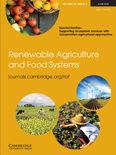
RENEWABLE AGRICULTURE AND FOOD SYSTEMS
Innovating solutions for global food security.RENEWABLE AGRICULTURE AND FOOD SYSTEMS, published by Cambridge University Press, is a leading open-access journal dedicated to the advancement of sustainability in agricultural practices and food systems. With an ISSN of 1742-1705 and an E-ISSN of 1742-1713, this journal spans the interdisciplinary fields of agronomy and food science, achieving a commendable Q2 ranking in both categories for 2023. As it continues to converge through the years from 2004 to 2024, the journal offers a platform for researchers, professionals, and students to disseminate transformative research that addresses the challenges of food security, resource management, and environmental impact. The journal’s significant impact is underscored by its Scopus rankings, situating it in the 77th percentile among agronomy and crop science publications, and the 67th percentile in food science. Since becoming fully open access in 2023, RENEWABLE AGRICULTURE AND FOOD SYSTEMS promotes wider accessibility to vital research findings, fostering collaboration and innovation in the pursuit of sustainable agricultural practices and food systems worldwide.

AGROCIENCIA
Advancing agricultural innovation for a sustainable future.AGROCIENCIA, published by COLEGIO POSTGRADUADOS, is a key journal in the fields of agronomy, animal science, and environmental science in Mexico. With an ISSN of 1405-3195 and an E-ISSN of 2521-9766, this journal has been a crucial platform for disseminating research findings since its inception in 2000. Operating from Montecillo, Estado Mexico, it provides an outlet for scholars and practitioners to share innovations and insights that directly impact agricultural practices and environmental sustainability. Despite its current categorization in the Q4 quartile across multiple disciplines, AGROCIENCIA strives to elevate the quality and reach of research, fostering a collaborative approach to tackle pressing issues within the agricultural sciences. Access options are primarily through institutional subscriptions, allowing for a diverse audience of researchers, professionals, and students to engage with the latest studies aimed at advancing knowledge in the agricultural sector. As the journal converges towards its 2024 milestone, it remains dedicated to enhancing scientific inquiry and promoting effective solutions within its discipline.

Agrisost
Open access to groundbreaking agricultural research.Agrisost is a prominent, peer-reviewed Open Access journal dedicated to advancing research in the fields of agriculture and sustainable development. Published by the University of Camagüey Ignacio Agramonte Loynaz in Cuba, this journal has been providing researchers and professionals with a platform to disseminate their findings since 2011. With its unique focus on the challenges and innovations in agricultural practices, Agrisost aims to bridge the gap between theory and application, fostering a collaborative environment for scientists, practitioners, and students alike. The journal’s commitment to open access ensures that a diverse audience can access high-quality research without barriers, making it an invaluable resource for anyone engaged in agricultural sciences. Researchers and students are encouraged to contribute their insights and findings to help shape the future of sustainable agriculture and food security.